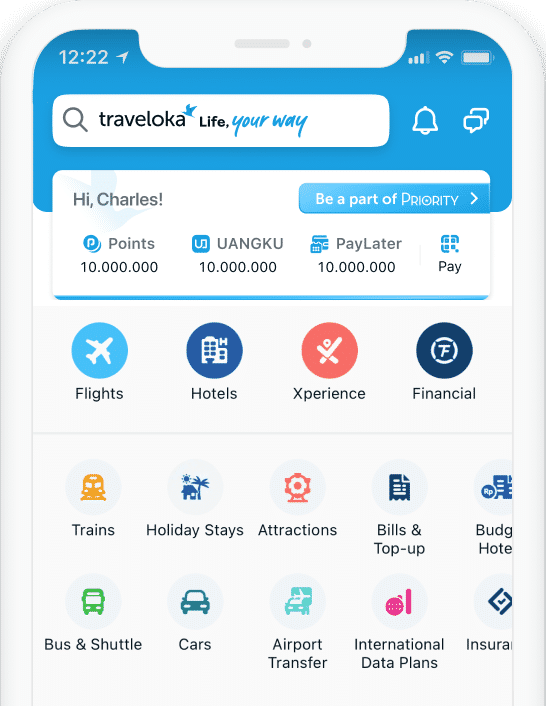
Hotels in Can Tho City
- Hotel/
- Vietnam(17444 Hotels)/
- Can Tho City(197 Hotels)
Destinations to Discover

Why Pay More
When You Can Pay Less?

Popular Hotels in Can Tho City
Discover what you like
Stay near exciting spots
Plenty of options, whatever your occasion
Đăng ký để sử dụng coupon
Giảm ngay 50K
8% giảm giá Khách sạn
8% giảm Hoạt động Du lịch
12% giảm Đưa đón sân bay
10% giảm Thuê xe
More about Can Tho City
Introduction
Can Tho, the heart of Vietnam’s Mekong Delta, is a vibrant city known for its floating markets, lush canals, and warm hospitality. As the largest city in the Delta region, Can Tho serves as a gateway to unique cultural experiences and scenic waterways. Whether you’re exploring the bustling Cai Rang Floating Market, enjoying traditional Mekong cuisine, or cruising through tranquil canals, Can Tho offers an unforgettable journey into the charm of Southern Vietnam. Finding the perfect hotel in Can Tho ensures you’re well-placed to immerse yourself in the city’s attractions and natural beauty.
Why Visit Can Tho?
Can Tho is renowned for its floating markets, where locals trade fresh produce and goods directly from their boats, offering a glimpse into the Mekong Delta's unique way of life. Beyond the markets, the city boasts a vibrant food scene, charming countryside, and a blend of traditional and modern attractions. Can Tho’s laid-back atmosphere, coupled with its cultural richness, makes it an ideal destination for those seeking both relaxation and adventure.
How to Book a Hotel in Can Tho at a Good Price
Use Traveloka for Convenient Booking
Traveloka provides a wide range of accommodation options in Can Tho, from riverside resorts to budget-friendly guesthouses. With user-friendly features and verified reviews, Traveloka is a trusted platform for finding the best deals.
- Exclusive Discounts: Look out for flash sales and app-only promotions.
- Wide Selection: Browse hotels in key areas like Ninh Kieu and Cai Rang.
- Verified Reviews: Make informed decisions with feedback from other travelers.
Book During the Right Season
The best time to visit Can Tho is during the dry season, from November to April, when the weather is cool and pleasant. To secure the best rates, consider traveling during the shoulder months of November or April, when the city is less crowded but the weather is still favorable.
Plan and Book in Advance
Advance booking is key to getting the best prices, especially for accommodations near popular attractions like Ninh Kieu Wharf. Many hotels offer free cancellation policies, giving you flexibility in your travel plans.
Where to Stay in Can Tho
Can Tho offers a variety of accommodations catering to all budgets and preferences. Here’s a look at the best areas to stay:
Ninh Kieu District: The Heart of Can Tho
Ninh Kieu is the central district of Can Tho, known for its vibrant nightlife, riverside promenade, and easy access to key attractions like Ninh Kieu Wharf and the Can Tho Museum.
- Luxury Hotels: Vinpearl Hotel Can Tho offers panoramic views of the Hau River and top-notch amenities, while Muong Thanh Luxury Can Tho Hotel provides elegant accommodations with a central location.
- Mid-Range Hotels: TTC Hotel - Premium Can Tho and Nesta Hotel Can Tho are excellent choices for comfort and affordability.
- Who It’s For: Perfect for first-time visitors, families, and those seeking convenience.
Cai Rang: Floating Market Proximity
Staying near Cai Rang allows you to experience the iconic floating market in the early morning, the best time to witness its vibrant activity.
- Recommended Hotels: Hung Homestay offers a cozy, authentic experience, while Victoria Can Tho Resort provides a luxurious riverside retreat.
- Who It’s For: Ideal for cultural enthusiasts and those looking to explore the floating markets.
Rural Homestays: Authentic Mekong Experience
For travelers seeking an immersive experience, rural homestays in the Mekong countryside provide a unique opportunity to connect with local life. These accommodations often include activities like boat tours, fishing, and cooking classes.
- Popular Homestays: Green Village Mekong and Nguyen Shack Homestay are highly rated for their authentic experiences and warm hospitality.
- Who It’s For: Great for eco-tourists and those looking for a deeper connection with local culture.
Best Places to Eat in Can Tho
Can Tho’s culinary scene is a highlight of any visit, showcasing the fresh flavors of the Mekong Delta. From bustling markets to riverside restaurants, the city offers a wide range of dining experiences.
Street Food and Local Markets
Cai Rang Floating Market is a must-visit for food lovers. Vendors sell freshly made dishes like hu tieu (noodle soup), banh xeo (Vietnamese pancakes), and tropical fruits straight from their boats. Ninh Kieu Night Market is another great spot for street food, offering everything from grilled seafood to sweet treats.
Traditional Vietnamese Restaurants
For a sit-down experience, Can Tho boasts a variety of restaurants serving Mekong specialties. Nam Bo Restaurant is a favorite for its authentic dishes and charming atmosphere, while L’Escale by Mekong offers riverside dining with a fusion of local and Western flavors.
Cafés and Desserts
Can Tho’s café culture is thriving, with charming spots like Hoa Su Coffee offering serene views of the Hau River. For dessert, try the local specialty banh tet chuoi (banana sticky rice cake), a sweet treat that reflects the region’s culinary heritage.
Best Places to Visit in Can Tho
Can Tho is brimming with attractions that highlight the culture, history, and natural beauty of the Mekong Delta.
Cai Rang Floating Market
The Cai Rang Floating Market is Can Tho’s most famous attraction. Arrive early in the morning to see vendors trading fresh produce, seafood, and breakfast dishes from their boats. It’s a vibrant and colorful spectacle that provides insight into local life.
Ninh Kieu Wharf
Ninh Kieu Wharf is the heart of Can Tho’s riverside charm. This lively area features a promenade, shops, and restaurants, as well as boat tours that explore the city’s waterways. In the evening, the area lights up with street performances and a bustling night market.
Can Tho Museum
Learn about the history and culture of the Mekong Delta at the Can Tho Museum. Exhibits include artifacts, photographs, and displays on the region’s ethnic groups, traditional crafts, and historical milestones.
Bang Lang Stork Sanctuary
Located just outside the city, Bang Lang Stork Sanctuary is a peaceful haven where thousands of storks gather. The best time to visit is during the late afternoon when the birds return to their nests, creating a spectacular sight.
Binh Thuy Ancient House
Binh Thuy Ancient House is a well-preserved French colonial mansion that offers a glimpse into the architectural style and lifestyle of the region’s wealthy families during the early 20th century.
Best Time to Visit Can Tho
Can Tho’s tropical climate ensures warm temperatures throughout the year, but understanding its seasonal variations can help you plan an optimal visit. The city experiences two main seasons: the dry season and the rainy season. Each season offers unique experiences and advantages, depending on your travel preferences.
Dry Season (November to April)
The dry season is the best time to visit Can Tho, offering sunny days, pleasant temperatures, and minimal rainfall. During this period, the weather is typically warm and dry, with average temperatures ranging from 25°C to 30°C (77°F to 86°F). These conditions are ideal for exploring the city’s iconic floating markets, scenic waterways, and lush gardens.
November and December are particularly popular months for visitors, as the cool breezes make outdoor activities enjoyable. This is the perfect time to take early morning boat tours to Cai Rang Floating Market or explore the tranquil canals of the Mekong Delta. January and February coincide with Tet, the Vietnamese Lunar New Year, when the city is vibrant with festivities, decorations, and traditional performances.
March and April are slightly warmer, but still pleasant enough for sightseeing. During this time, you can enjoy the blooming of seasonal flowers and explore Can Tho’s countryside. With clear skies and vibrant landscapes, the dry season provides the perfect backdrop for photography enthusiasts.
Rainy Season (May to October)
The rainy season in Can Tho is characterized by increased humidity and frequent rain showers, often occurring in the late afternoon or evening. While this may seem like a deterrent, the rains typically last for short periods and rarely disrupt travel plans. The temperatures during this season range from 27°C to 33°C (81°F to 91°F), creating a warm and lush environment.
One of the major advantages of visiting during the rainy season is the lush greenery that blankets the Mekong Delta. The fertile land bursts with life, offering a picturesque setting for nature lovers. Additionally, the rainy season is considered the low tourist season, resulting in fewer crowds and lower accommodation rates.
The rainy season is also the best time to enjoy Can Tho’s abundant fruit harvests. Orchards are teeming with ripe tropical fruits, and many farms welcome visitors for fruit-picking experiences. If you’re planning to visit during this season, bring a lightweight raincoat or umbrella and plan outdoor activities in the mornings when rain is less likely.
Seasonal Events
Can Tho hosts several events that enhance the travel experience. Tet, celebrated in January or February, is a vibrant cultural festival marked by family gatherings, traditional foods, and festive markets. The Southern Fruit Festival, held in June, showcases the Mekong Delta’s rich agricultural produce and features cultural performances.
Things to Know When Traveling to Can Tho
Traveling to Can Tho is an exciting opportunity to experience the vibrant culture and stunning natural beauty of the Mekong Delta. To ensure a smooth and enjoyable trip, it’s important to familiarize yourself with essential information about transportation, cultural customs, and travel tips.
Transportation in Can Tho
Can Tho is well-connected by various transportation options, making it easy to access and navigate. The city is serviced by Can Tho International Airport, which offers domestic flights from Hanoi, Ho Chi Minh City, and other major cities. From the airport, you can reach the city center in about 20 minutes by taxi or Grab, a popular ride-hailing app in Vietnam.
For those traveling from Ho Chi Minh City, buses are a convenient and affordable option, with several operators providing comfortable journeys that take approximately four hours. Alternatively, private cars can be arranged for a more flexible and personalized travel experience.
Within Can Tho, motorbikes are the most common mode of transportation, with rentals available for independent exploration. For shorter distances, taxis and Grab rides are widely available. Boats and ferries are essential for exploring the city’s waterways and nearby floating markets.
Currency and Payment
The local currency in Can Tho is the Vietnamese Dong (VND). While cash is widely used, credit cards are accepted in most hotels, restaurants, and shopping malls. ATMs are readily available throughout the city for convenient cash withdrawals. It’s advisable to carry smaller denominations of cash for purchases at local markets, street food stalls, and rural areas where card payments are not accepted.
Cultural Etiquette
Understanding and respecting local customs will enhance your experience in Can Tho. When visiting temples or pagodas, dress modestly by covering your shoulders and knees. Always remove your shoes before entering sacred places or someone’s home. A polite greeting, such as “Xin chào” (hello), accompanied by a smile, is appreciated by locals.
Can Tho’s residents are known for their hospitality, but it’s important to avoid raising your voice or displaying frustration in public. Vietnamese culture places a strong emphasis on respect and harmony, so maintaining a calm demeanor is essential.
Food and Water Safety
Can Tho is famous for its fresh seafood and local specialties, such as hu tieu (rice noodle soup) and banh xeo (crispy pancakes). Street food is safe to try, especially at busy stalls with high turnover. However, it’s best to choose freshly cooked dishes. Stick to bottled or filtered water, which is widely available and affordable, as tap water is not safe for drinking.
Shopping Tips
Local markets, such as Cai Rang Floating Market and Ninh Kieu Night Market, are great places to shop for fresh produce, souvenirs, and handmade crafts. Bargaining is common in markets, but always do so politely. Prices in stores and malls are generally fixed.
Health and Safety
Can Tho is a safe city for travelers, but it’s always wise to stay cautious. Keep your belongings secure, especially in crowded areas. For medical emergencies, Can Tho has several clinics and hospitals that provide quality care. Travel insurance is recommended to cover unexpected health issues or emergencies.
Useful Tips
- Schedule activities early in the morning to avoid the midday heat or afternoon rains.
- Learn basic Vietnamese phrases to communicate effectively with locals.
- Pack lightweight clothing, a raincoat, and mosquito repellent for a comfortable trip.
Conclusion
Can Tho is a captivating destination that embodies the charm and culture of Vietnam’s Mekong Delta. With its iconic floating markets, tranquil waterways, lush orchards, and warm hospitality, the city offers a unique blend of natural beauty and authentic experiences. Whether you’re exploring the vibrant Cai Rang Floating Market at sunrise, savoring the flavors of Mekong cuisine, or relaxing in a riverside resort, Can Tho promises unforgettable memories.
Finding the right hotel in Can Tho is essential to fully enjoy your visit. From luxurious accommodations in Ninh Kieu to cozy homestays near Cai Rang, there are options to suit every traveler’s needs. The best time to visit, whether during the dry season for outdoor activities or the rainy season for lush landscapes and fewer crowds, ensures that Can Tho is a destination for all seasons.
With proper planning and an appreciation for the region’s cultural and natural treasures, your journey to Can Tho will be a highlight of your travels in Vietnam. Start organizing your trip today and get ready to immerse yourself in the magic of this vibrant Mekong Delta city.
Facts about hotel in Can Tho City
Total Accommodation | 197 Properties |
Popular City | Ninh Kieu District, Binh Thuy District |
Popular Hotel | Charmant Suites - A Boutique Hotel Can Tho, Sheraton Can Tho |
Popular Landmark | Ho Chi Minh Museum, Pasar Terapung Cai Rang |
Frequently asked questions

Guest reviews in hotel near Can Tho City
Why book Accommodation in Traveloka?



We’ve got more than just hotels










































 Facebook
Facebook Instagram
Instagram TikTok
TikTok Youtube
Youtube Telegram
Telegram